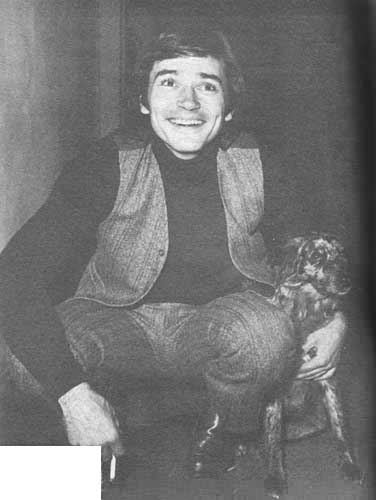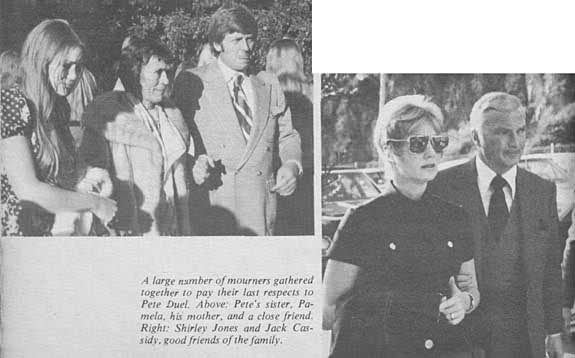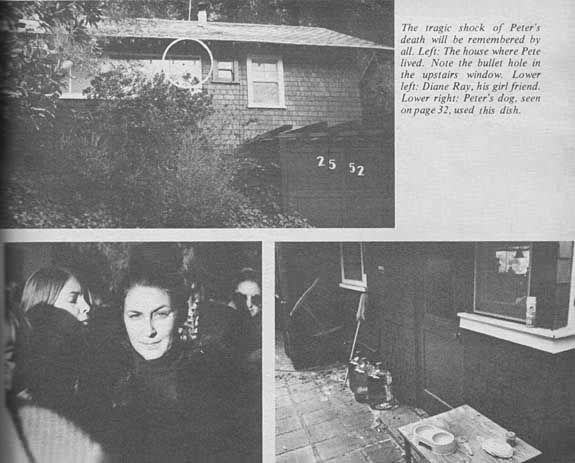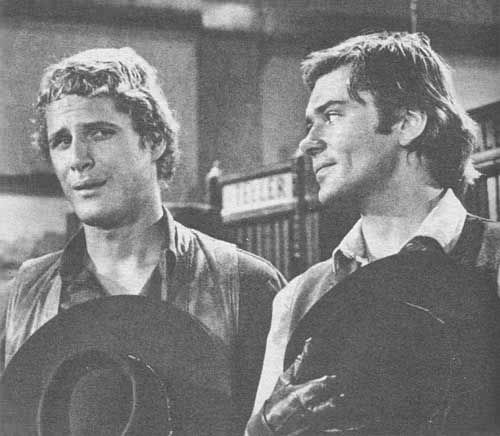- THE SHOCKING TRUTH ABOUT PETER DUEL'S
SUDDEN DEATH!
by Stephen Lewis
Movie World, April 1972
 The driveway
of the small wooden house blazed with colored Christmas lights
that had been set out only a few days before. In their reflection,
and the lights of the parked police cars, the girl stood still,
her face numbed with shock and tragedy.
The driveway
of the small wooden house blazed with colored Christmas lights
that had been set out only a few days before. In their reflection,
and the lights of the parked police cars, the girl stood still,
her face numbed with shock and tragedy.
Reporters held up cameras and shouted
questions, but the girl couldn't answer. And as the stretcher
was carried to the waiting ambulance, even the questions stopped--the
coarse blanket that stretched over the lifeless body answered
them all. The girl was Diane Ray, and the body was that of Peter
Duel, the star of the hit series ALIAS SMITH AND JONES. The night
of Thursday, December 30, had started out to be a quiet one for
the couple who had recently gotten back together after a breakup--in
the early hours of December 31, it had ended in a tragedy that
was headlined in newspapers and talked about on national news
programs.
Pete had asked Diane, his steady girl,
to spend the evening at his house. They had watched television--a
basketball game and then his series--and he'd been upset at the
evening's episode. When the show was over, Pete had excused himself
and gone into the living room, stopping first to take another
drink. He'd also taken his .38 pistol. Moments later, he lay dead
beneath the Christmas tree in the living room, a bullet in his
head!
On the surface, the story is sad and simple,
and the headlines of "Young Actor Takes His Life!" might
have written themselves. But to those who knew Pete Duel not as
the TV star he was but as a man, the sadness of the story is tragic.
"There was always something tragic
about him," an executive who had worked with Pete at Universal
Studios, where his show was filmed, said. "He seemed so strange
and so somber--as if he were lost in Hollywood.
It wasn't so much in Hollywood that Pete
was lost, but in himself. In interviews, stories, and official
studio press releases he was a rising star who had a great future
ahead of him. In reality, he was a thirty-one-year old man who
had been in and out of Alcoholics Anonymous several times, and
who was deeply troubled by what he felt to be the problems of
his career.
For an indication of the real Pete Duel--Born
Peter Deuel-one had to know the behind-the-scenes story of ALIAS
SMITH AND JONES, the story that was talked about on the lot but
kept from the public.
The story began happily. Last summer,
when the show was selected by ABC-TV for prime time viewing, Pete
was thrilled. He'd guested on series such as MARCUS WELBY, THE
VIRGINIAN, and THE BOLD ONES. He was working steadily, but he
felt he was getting nowhere.
At thirty-one executives told Pete, he
still had a lot of time to make it. True, some of his movies--such
as GENERATION--hadn't exactly set the fans or critics on fire,
but the right break was sure to come along. Pete wanted to believe
them, but at Universal he saw too many hopefuls who had been signed
to the studio's talent program knocked off the payroll when their
"big breaks" never seemed to arrive. Many of the kids
who made the guest-star circuit at the studio were a good five
or even ten years younger than Pete--and distortions on an official
studio biography didn't make it any easier for him to lie to himself
about his age.
When SMITH AND JONES came along, it seemed
like the answer. The series was funny, clever, and loosely based
on two characters like those who made BUTCH CASSIDY AND THE SUNDANCE
KID such a successful film. It wasn't the most original idea in
TV history--but by studio and network standards it was marketable.
Part of the sell was to young audiences--and
that meant Pete had to play the Hollywood game to the best of
his ability. For several years he had a drinking problem, and
though he'd been able to kick the habit for a while with the help
of AA, he had fallen off the wagon with a thud while depressed
about his career. Now, Pete had to be careful--but it seemed his
spirits might life with the success of the show, and that his
drinking problem might cure itself.
The first episode aired, and Pete received
good reviews. He was happy--for a while.
The happiness, though, soon faded. For
one thing, Pete and his co-star, Ben Murphy, didn't get along.
Ben has never been the easiest person to get along with around
Universal, and in time the animosity that Pete had tried to conceal
turned into a deadly silence that saw the two stars speaking only
in front of the camera.
Then, too, there were problems with producers.
Pete was unhappy with the scripts for the show, and when the ratings
began to slip, he complained. But he could only verbalize some
of his feelings--others were expressed in the way he refused to
pose for publicity shots and turned down numerous interview requests.
His hopes for stardom seemed to fade with
the decline in the show's popularity, and Pete began to drink
again.
There were a couple of bright spots in
Pete's life, and Diane Ray was one of them. They had dated for
over a year, but just when it seemed that they might get married,
they had broken up.
Pete drank again--and he was arrested
on a drunk driving charge that let to two years probation. He
missed Diane, friends said. But shortly before his death, the
couple had gotten back together, and Pete was full of hope.
"This will be a new feeling,"
he predicted optimistically. "We've both changed quite a
bit. We've both learned quite a lot from whatever we've done before.
And we're going at it just one step at a time."
Pete had changed all right--but friends
sadly recall that he'd grown even more introverted than usual.
He seemed to carry the problems of his show wherever he went,
taking the troubles of the set far more seriously than most actors.
Pete thought that SMITH AND JONES might be canceled--and perhaps
he felt that with it his own chances might be gone.
There were those who told him he was wrong.
Diane, his brother Geoffrey Deuel, his family in Rochester, New
York--all gave him their love and understanding. But Pete needed
to feel that he had made it.
Unlike his brother, Pete had changed his
family name to a more common spelling. Though "it's easier"
was the studio's official reason when asked why Deuel had become
Duel, it is a fact that the name change came after Pete lunched
with numerologist Guerin Moore and was advised that his original
name was unlucky.
But luck, no matter what he called himself,
wasn't with Pete. There were times when he seemed fortunate--like
when he was selected for a leading role in Hollywood Television
Theatre's production THE SCARECROW, the show that would kick off
the prestigious series. It was a story of the occult and the supernatural--and
on the set Pete seemed thoroughly involved in the subject as he
read THE DEVIL AND DANIEL WEBSTER. But there were failures, too.
Pete had seen, time after time, hopes of his come to nothing.
His movies had flopped. He'd gone through sad love affairs, such
as the romance with Kim Darby that had almost led to marriage.
Recently, there had been a new kind of
rejection. Pete had run for an office in the Screen Actors Guild
elections, and it had seemed that he might win. But the telegram
that arrived at his house told him that he'd failed once again.
As if the news epitomized the problems
of his life, Pete framed the telegram, hung it on the wall, and
shot a hole in it with the same gun that later killed him. This
took place just a week before his death.
The holiday season failed to life Pete's
spirits. Everyone he met seemed determined to be happy and carefree,
but faced with a sinking series, this was one time when Pete could
no longer play the Hollywood game. Instead, he became more withdrawn
then ever, sulking on the set and talking only with friends like
Belinda Montgomery, who visited him on the afternoon of December
30.
A stunt man drove Pete home that day,
and once in the house he had a drink. Diane arrived after Pete
called her, and they watched TV. She complimented him on his SMITH
AND JONES performance, but Pete was unhappy. He didn't like the
script or the direction or the cast--and maybe he didn't like
himself.
As another New Year approached, perhaps
the prospect of more disappointment was too much to bear. A shot
was fired, and by the time Diane reached the living room, Pete
was dead under the Christmas tree.
When the police arrived, according to
first reports, there was talk of a "slaying." As the
facts became clearer, the reports "probably suicide"'
or the kinder "'accidental death." Pete's brother Geoffrey
insisted that he couldn't have taken his own life.
There are still questions about what Pete
was thinking that tragic night, and there always will be. There
are questions, too, about what might have become of his career,
and possibilities that long-awaited break might have come.
But Peter Duel didn't wait for the answers.
The failure and frustration that had been with him for so long
finally won out, and a loaded gun took Pete's life...



Back to Articles List
 The driveway
of the small wooden house blazed with colored Christmas lights
that had been set out only a few days before. In their reflection,
and the lights of the parked police cars, the girl stood still,
her face numbed with shock and tragedy.
The driveway
of the small wooden house blazed with colored Christmas lights
that had been set out only a few days before. In their reflection,
and the lights of the parked police cars, the girl stood still,
her face numbed with shock and tragedy.


